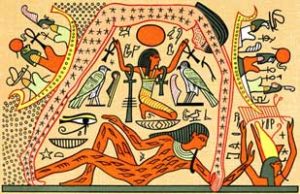The presence of Father Earth—over the commonly known Greek-originated Mother Earth—is one of the most pressing reminders of the influence of Ancient Egyptian mythology in the Broken Earth trilogy. I soon realized that other influences did exist but just required a bit more digging. I accepted this challenge and found evidence that links one of the core (pun intended) decisions made by Jemisin’s Father Earth to the role of the Egyptian parallel, the god Geb.
 In an article titled Geb Jenny Hill, a scholar with a focus on Egyptology, mentions that in Egyptian mythology Geb is the god of the earth and the third divine pharaoh to have existed. Hill shares that Geb’s creation story (one of many) explains his placement as god of the earth as punishment for sleeping with his sister-wife, Nut. My interest in Geb and his relation to Jemisin, was based on the role he played in the world of humans, particularly individuals who died. Hill explains that: “He had authority over the tombs buried in the earth…The justified dead were given words of power which allowed them to ascend to the sky, while those whose hearts were weighed down with guilt were trapped in the earth by Geb”. The presence of “justified” individuals acknowledges the presence of a ritual that determines this classification, known as “the weighing of the heart”. In this process of evaluating the heart the truth of an individual’s character is said to be revealed and later judged by specific gods. Hill states that Geb’s role in this after-death process paints him in such a way that, “he could be a malevolent being as well as beneficial deity, imprisoning the dead in his body”.
In an article titled Geb Jenny Hill, a scholar with a focus on Egyptology, mentions that in Egyptian mythology Geb is the god of the earth and the third divine pharaoh to have existed. Hill shares that Geb’s creation story (one of many) explains his placement as god of the earth as punishment for sleeping with his sister-wife, Nut. My interest in Geb and his relation to Jemisin, was based on the role he played in the world of humans, particularly individuals who died. Hill explains that: “He had authority over the tombs buried in the earth…The justified dead were given words of power which allowed them to ascend to the sky, while those whose hearts were weighed down with guilt were trapped in the earth by Geb”. The presence of “justified” individuals acknowledges the presence of a ritual that determines this classification, known as “the weighing of the heart”. In this process of evaluating the heart the truth of an individual’s character is said to be revealed and later judged by specific gods. Hill states that Geb’s role in this after-death process paints him in such a way that, “he could be a malevolent being as well as beneficial deity, imprisoning the dead in his body”.
Geb, the god of earth, and Jemisin’s Father Earth sharing this strikingly similar process of “imprisoning the dead” was too much to be considered a coincidence. So I revisited the scene in The Stone Sky, where we not only learn of Father Earth’s process of imprisoning humans but are also provided reasons for its actions.
Nassun introduces the concept of Father Earth’s imprisoning when she describes it as having a face, “where there should be none. …she sees another face—and another, more of them appearing all at once to fill the view…Dozens. Hundreds.” (Jemisin 246). Father Earth explains its right to these millions of lives (re)claimed over time—similar to Geb’s actions of imprisonment— as one rooted in exercising some (seemingly unbalanced) variation of justice. Following Father Earth’s logic: “for every iota of life siphoned from beneath the Earth’s skin, the Earth has dragged a million human remnants into its heart.” In case this seems to be a dramatic reaction, Father Earth takes a more simplified breakdown of its means: “Bodies rot in soil after all—and soil sits upon tectonic plates, plates eventually subduct into the fire under the Earth’s crust which convect endlessly through the mantle… and there within itself, the Earth eats everything they were. This is only fair…It is only right” (Jemisin 248). By creating this parallel between Geb’s role and Father’s earth wrath Jemisin seems to give us as readers the opportunity to figuratively weigh Father Earth’s heart.
If I was to take on this position my analysis would sound something like this:
Father Earth’s wrath is warranted. Considering the horrible levels of loss and exploitation it has suffered at the hands of humankind for merely…existing, I can’t say I blame it. When they encountered Father Earth humankind, as Nassun beautifully describes, made a terrifying—yet all too familiar—decision: “where they should have seen a living being, they saw only another thing to exploit. Where they should have asked, or left alone, they raped” (Jemisin 248). So when Father Earth reacts to this severe injustice, not only can I understand why it chooses the actions it does but also why there still exists some level of dissatisfaction with this solution. I mean, what “just” reaction can make up for all these past wrongs? One answer is given by Father Earth itself: “For some crimes, there is no fitting justice—only reparation”
